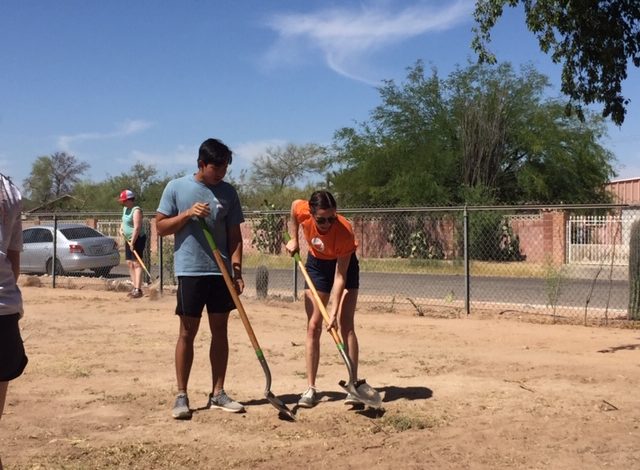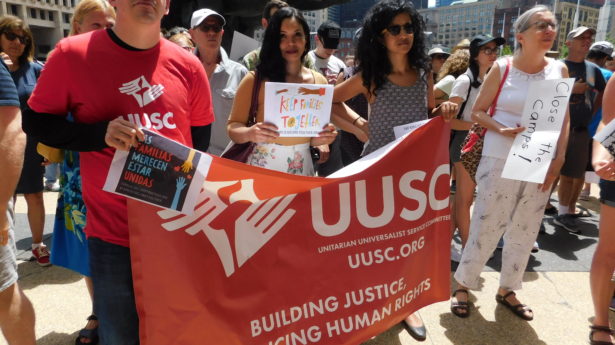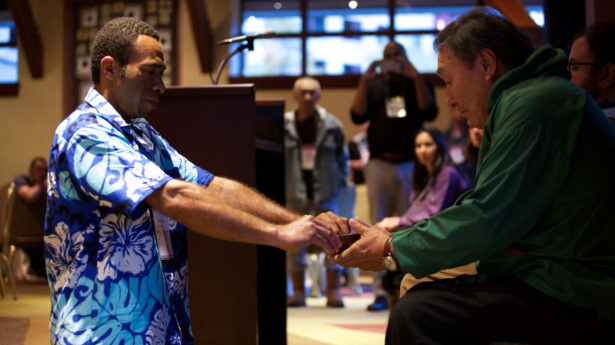The Unitarian Universalist Service Committee advances human rights through grassroots collaborations.
Reflections on Resilience and Partnership at the Border

By on August 15, 2019
In early June, I traveled to the U.S.-Mexico border for a one-week UU College of Social Justice training, Activate Tucson, alongside 20 participants from the First Unitarian Church of Dallas’ Young Religious UU group. UUCSJ’s program, led in conjunction with Borderlinks, engages youth groups in an experiential form of social justice education that equips them with the skills needed to produce real change in their local communities. For many, this was the first time they truly thought critically about their own communities – on face value, the privately-run detention centers scattered throughout Texas, and on a deeper level, the structures and inherent privilege that underpins their everyday life. Challenging our own assertions and connecting with affected communities within the context of their lived experiences strikes at the heart of UUSC’s own values – to continue showing up alongside and in support of our frontline grassroots partners. By the end of my week in Tucson, I had come to the realization that this experience epitomized how the intersection of youth engagement, grassroots expertise, and hand-in-hand partnerships can culminate in enduring acts of solidarity.
The first Borderlinks partner we met with, an activist from Mariposa sin Fronteras, seemed to personify the resiliency and strength of spirit we would continue to witness throughout our time in Tucson. A transgender woman from Mexico, she came to the U.S. seeking safety and acceptance, and was instead met with hostility and ultimately detained for three years in the men’s wing of a detention center as she awaited the outcome of her asylum claim. When relaying the harrowing details of her time there, she remarked that, “I just wanted to be acknowledged and accepted for who I am. I believe the human dignity that everyone has was taken from me.” Yet what the youth group seemed to find most striking was her vibrancy of spirit – each detail couched by a smile and joke – which served as yet another reminder of her strength and the strength of her community.
The next three days would prove to be challenging, enlightening, exhausting, and inspiring in varied degrees. One of the most impactful parts of the trip was the water drop, which served not only as an exercise in solidarity, but as an opportunity to experience just a semblance of the difficulties migrants face on their journey to safety. An early morning start time, appropriate clothing, and plenty of water and rest did little to lessen the physical and mental toll the Sonoran Desert had on us all during our two- and half-mile trek to various water drop off points. At each shady stop, our Borderlinks program leaders would relay the many tactics Border Patrol employed to deter, separate, confuse, and detain migrants fleeing incomprehensible circumstances. As we dropped our water jugs at designated locations, we were reminded that our small act of solidarity supported a much larger movement – hundreds of jugs had been placed before us with messages of support and love, bean cans had been placed neatly under trees, and a shrine constructed by the migrants themselves proved a moving tribute to those who died seeking safety.
As we made our next stop at the Border Wall in Nogales, a looming structure of barbed wire and metal, the image and meaning of that shrine remained at the forefront of my mind. There is something truly surreal and upsetting about witnessing people move about their lives through thin slits and barbed wire. While the desired effect of the wall may have been to dehumanize those on the other side, for all of us it seemed to serve a different purpose. People shopping, young children playing soccer in the streets, a mural to Jose Antonio Elena, a 16-year-old boy who was shot and killed by a Border Patrol agent in 2012, all seemed to humanize a discourse currently filled with bias and misinformation. Our next stop at the federal courthouse to witness “Operation Streamline” served a similar purpose. Sitting at the back of a near-empty courtroom for a little over an hour, we witnessed a judge convict nearly 70 migrants with misdemeanors and hand down detention and deportation orders. Many had been in the desert just the day before, most appeared to be just on the cusp of adulthood, and all of them were shackled at the hands and feet.
On the final day of the trip, the participants met to create an action plan for translating all they had seen, heard, and reflected on into real action. They were eager to come up with concrete next steps for engaging in activism in Dallas, and candidly discussed the viability of their ideas for action within their local community. It was clear that the events of the past week – their conversation with Mariposas Sin Fronteras, their time in the desert and at the Border Wall – had informed their tactics on community engagement and advocacy. This experiential process had not only sparked a commitment within the group to continue their activism beyond the trip, but also provided the tools and resources needed to do just that. That UUSC, hand in hand with its grassroots partners, can connect this sense of passion and purpose with tangible next steps and support networks is a powerful tool for combating not only the injustice I witnessed at the border, but around the world.
***
If you, your congregation, school or youth group is interested in joining the UU College of Social Justice in a border witness journey, please contact info@uucsj.org and learn more at https://uucsj.org/journeys/borderlinks/
***
About UUSC: Guided by the belief that all people have inherent worth and dignity, UUSC advances human rights globally by partnering with affected communities who are confronting injustice, mobilizing to challenge oppressive systems, and inspiring and sustaining spiritually grounded activism for justice. We invite you to join us in this journey toward realizing a better future!

